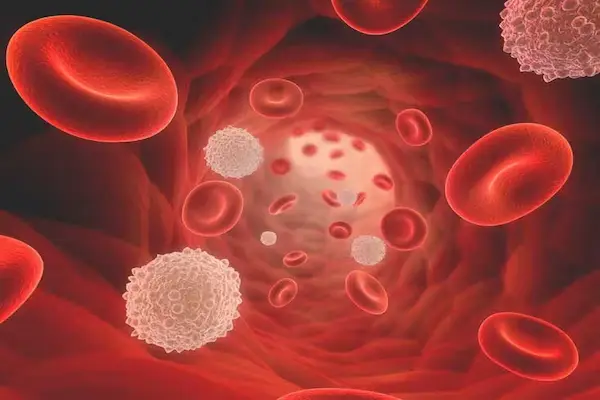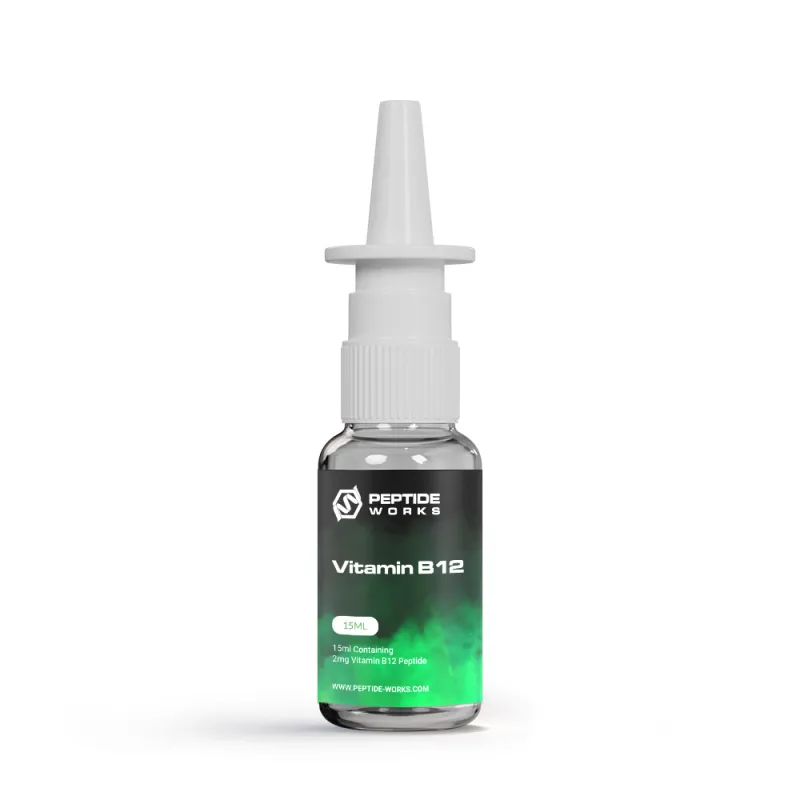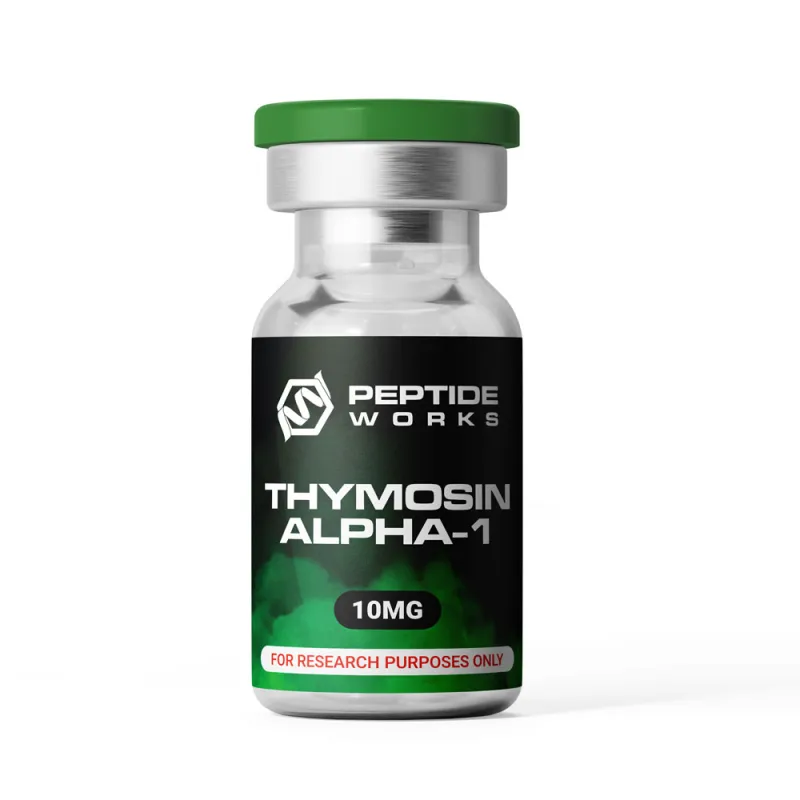
PROMO!
First order? Get 10% OFF with this code: 1storder
Written by

The Vitamin B12 immune system link is important because this vitamin plays a crucial role in DNA synthesis, methylation, energy production, and cell growth. These steps are needed for lymphocytes to multiply and for immune signals to stay balanced. In deficiency states, lymphocytes and neutrophils can be impaired, with dysgranulopoietic changes observed, and the body may struggle to fight off stress.
Thymosin Alpha-1 (Tα1) is a small peptide often studied for its role in immune support. It can activate dendritic cells and guide T cells to respond more effectively. Looking at B12 and Tα1 side by side highlights how nutrients and peptides influence immunity through different mechanisms.
To better understand this relationship, it is helpful to examine how the Vitamin B12 immune system link influences the production of white blood cells.
Explore Vitamin B12 from Peptide Works, a vital nutrient studied for its role in DNA synthesis, methylation, and immune cell support.

The Vitamin B12 immune system link shows up clearly in bone marrow activity, where new blood cells take shape. B12 drives DNA synthesis, methylation processes, and cell division, with effects reported on CD8+ T cells and possibly NK cell activity in deficiency states. Adequate B12 supports normal marrow cell production, helping sustain immune cell availability.
In ongoing studies, Vitamin B12 is sometimes examined alongside immunity peptides that influence white blood cell activity and immune modulation. Studies have linked B12 deficiency with reduced lymphocyte counts, particularly CD8+ T cells, and weaker immune protection. Restoring healthy levels improves lymphocyte growth and balance, showing how this nutrient directly strengthens immune readiness and supports ongoing research into immunity.
Since white blood cells include several types, it is useful to look more closely at lymphocytes, which carry much of the adaptive immune response.
Lymphocytes, which include T cells, B cells, and natural killer cells, form the core of the adaptive immune system. In a healthy state, the Vitamin B12 immune system relies on this nutrient for DNA synthesis and methylation essential steps that allow lymphocytes to multiply and respond to antigens. In deficiency states, B12 is required to keep these cells active and balanced; deficiency slows their growth and weakens immune defense.
Studies have shown that low B12 levels reduce lymphocyte activity and alter immune cell ratios. This shift limits the body’s ability to mount strong defenses. Since Thymosin Alpha-1 also acts on lymphocyte pathways, both have been studied individually for their immune effects, though no research has examined them in combination.
Within the group of lymphocytes, T cells deserve special attention due to their central role in coordinating the immune defense.

T cells guide immune responses by coordinating helper and cytotoxic activity. The Vitamin B12 immune system link extends into this balance, where B12 supports healthy CD4 and CD8 ratios. When B12 levels fall, the CD4/CD8 ratio often increases due to reduced CD8+ T cell production, making immune control less precise.
Research suggests B12 deficiency lowers T cell counts and may alter their signaling. Changes in cytokine release reduce communication across the immune network. While Thymosin Alpha-1 stimulates T cell activation through separate pathways, no evidence exists showing combined effects with B12.
While T cells carry out much of the immune response, their activity often depends on cues from dendritic cells.
Dendritic cells act as messengers between innate and adaptive immunity, presenting antigens to T cells. Thymosin Alpha-1 plays a direct role in this process by activating toll-like receptor signaling pathways (TLR3/4/9) on dendritic cells. This interaction stimulates the cells to mature, release cytokines, and enhance antigen presentation. As a result, T cells receive stronger activation signals, allowing the immune system to mount a faster and more targeted response.
Researchers have shown that Tα1 improves dendritic cell efficiency in both viral and tumor-related studies. While Vitamin B12 supports the growth and balance of immune cells, no studies have investigated its interaction with Tα1 in this context.
Once dendritic cells are engaged, their influence extends further through the release of cytokines that shape communication across the immune system.
Discover Thymosin Alpha-1 at Peptide Works, a peptide researched for its ability to activate dendritic cells and guide T cell responses.

Cytokines are messengers that guide how strong or weak an immune response will be. Thymosin Alpha-1 helps this process by making dendritic cells and T cells release balanced cytokine signals. These signals turn on natural killer cells, guide helper T cells, and keep the immune system from overreacting.
Studies have shown that Tα1 raises levels of interferon-gamma and interleukin-2. Both play key roles in fighting viruses and controlling tumor growth. In deficiency states, restoring B12 supports lymphocytes so they can respond to these signals. While both play roles in immunity, no research has examined them together.
Bringing these strands together highlights what is known about the Vitamin B12 immune system connection and points to where future research may be heading.
Research into the Vitamin B12 immune system link and Thymosin Alpha-1 shows promising but separate directions for future studies. B12 supports immune cell growth, while Tα1 modulates activation and signaling. These represent separate but important pathways under investigation.
At Peptide Works, we provide high-quality research peptides to support this kind of exploration. As interest in the Vitamin B12 immune system and Thymosin Alpha-1 continues to grow, future findings may reveal new insights, though no studies have yet examined their combined effects.
All products discussed are supplied for research purposes only and are not intended for human use.
[1] Tamura J, Kubota K, Murakami H, Sawamura M, et al. Immunomodulation by vitamin B12: augmentation of CD8+ T lymphocytes and natural killer (NK) cell activity in vitamin B12-deficient patients by methyl-B12 treatment. Clin Exp Immunol. 1999 Apr;116(1):28-32.
[2] Kubota K, Kurabayashi H, Kawada E, Okamoto K, Shirakura T. Restoration of abnormally high CD4/CD8 ratio and low natural killer cell activity by vitamin B12 therapy in a patient with post-gastrectomy megaloblastic anemia. Intern Med. 1992 Jan;31(1):125-6.
[3] Crist WM, Parmley RT, Holbrook CT, Castleberry RP, et al. Dysgranulopoietic neutropenia and abnormal monocytes in childhood vitamin B12 deficiency. Am J Hematol. 1980;9(1):89-107.
[4] Bozza S, Gaziano R, Bonifazi P, Zelante T, et al. Thymosin alpha1 activates the TLR9/MyD88/IRF7-dependent murine cytomegalovirus sensing for induction of anti-viral responses in vivo. Int Immunol. 2007 Nov;19(11):1261-70.
[5] King R, Tuthill C. Immune Modulation with Thymosin Alpha 1 Treatment. Vitam Horm. 2016;102:151-78.
ALL CONTENT AND PRODUCT INFORMATION AVAILABLE ON THIS WEBSITE IS FOR EDUCATIONAL PURPOSES ONLY.
DISCLAIMER: These products are intended solely as a research chemical only. This classification allows for their use only for research development and laboratory studies. The information available on our Peptide Works website: https://peptide-works.com/ is provided for educational purposes only. These products are not for human or animal use or consumption in any manner. Handling of these products should be limited to suitably qualified professionals. They are not to be classified as a drug, food, cosmetic, or medicinal product and must not be mislabelled or used as such.
Peptide Works
Related Articles

What are the Best Cognitive Peptides?
Cognitive peptides are short chains of amino acids that researchers are exploring for their potential effects on brain function. They

Achieving increased skin pigmentation without prolonged sun exposure has been demonstrated with Melanotan peptides in research. Two commonly studied options,

Can PTD-DBM Hair Growth Peptide Stop Balding?
Hair thinning and balding affect millions worldwide, often leading to frustration and limited options. This challenge has driven researchers to